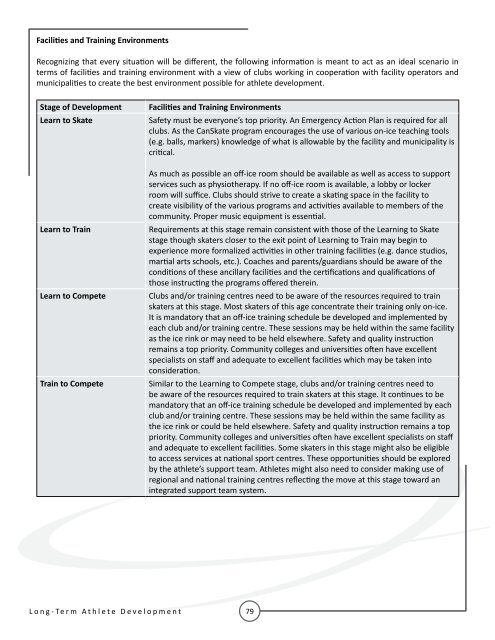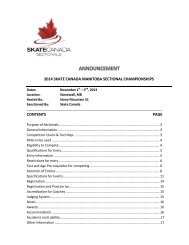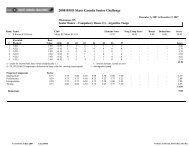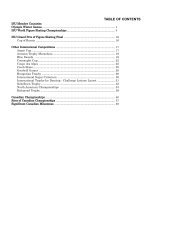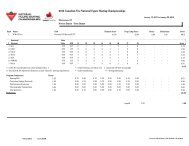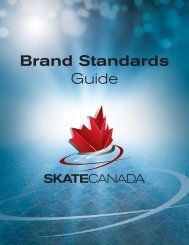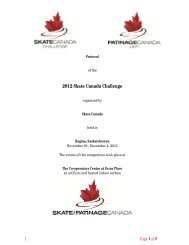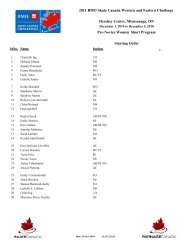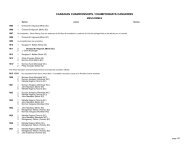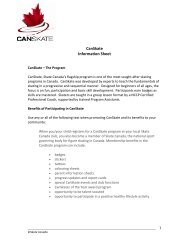LONG-TERM ATHLETE DEVELOPMENT - Skate Canada
LONG-TERM ATHLETE DEVELOPMENT - Skate Canada
LONG-TERM ATHLETE DEVELOPMENT - Skate Canada
You also want an ePaper? Increase the reach of your titles
YUMPU automatically turns print PDFs into web optimized ePapers that Google loves.
Facilities and Training Environments<br />
L o n g - Te r m A t h l e t e D e v e l o p m e n t<br />
79<br />
865 Sheord Road, Ottawa, Ontario K1J 1H9<br />
Recognizing that every situation will be different, the following information is meant to act as an ideal scenario in<br />
Phone 613.747.1007 I Toll Free 1.888.747.2372 I Fax 613.748.5718 I Toll Free Fax 1.877.211.2372<br />
terms of facilities and training environment with a view of clubs working in cooperation with facility operators and<br />
municipalities to create the best environment possible for athlete development.<br />
Stage of Development Facilities and Training Environments<br />
Learn to <strong>Skate</strong> Safety must be everyone’s top priority. An Emergency Action Plan is required for all<br />
clubs. As the Can<strong>Skate</strong> program encourages the use of various on-ice teaching tools<br />
(e.g. balls, markers) knowledge of what is allowable by the facility and municipality is<br />
critical.<br />
As much as possible an off-ice room should be available as well as access to support<br />
services such as physiotherapy. If no off-ice room is available, a lobby or locker<br />
room will suffice. Clubs should strive to create a skating space in the facility to<br />
create visibility of the various programs and activities available to members of the<br />
community. Proper music equipment is essential.<br />
Learn to Train Requirements at this stage remain consistent with those of the Learning to <strong>Skate</strong><br />
stage though skaters closer to the exit point of Learning to Train may begin to<br />
experience more formalized activities in other training facilities (e.g. dance studios,<br />
martial arts schools, etc.). Coaches and parents/guardians should be aware of the<br />
conditions of these ancillary facilities and the certifications and qualifications of<br />
those instructing the programs offered therein.<br />
Learn to Compete Clubs and/or training centres need to be aware of the resources required to train<br />
skaters at this stage. Most skaters of this age concentrate their training only on-ice.<br />
It is mandatory that an off-ice training schedule be developed and implemented by<br />
each club and/or training centre. These sessions may be held within the same facility<br />
as the ice rink or may need to be held elsewhere. Safety and quality instruction<br />
remains a top priority. Community colleges and universities often have excellent<br />
specialists on staff and adequate to excellent facilities which may be taken into<br />
consideration.<br />
Train to Compete Similar to the Learning to Compete stage, clubs and/or training centres need to<br />
be aware of the resources required to train skaters at this stage. It continues to be<br />
mandatory that an off-ice training schedule be developed and implemented by each<br />
club and/or training centre. These sessions may be held within the same facility as<br />
the ice rink or could be held elsewhere. Safety and quality instruction remains a top<br />
priority. Community colleges and universities often have excellent specialists on staff<br />
and adequate to excellent facilities. Some skaters in this stage might also be eligible<br />
to access services at national sport centres. These opportunities should be explored<br />
by the athlete’s support team. Athletes might also need to consider making use of<br />
regional and national training centres reflecting the move at this stage toward an<br />
integrated support team system.


